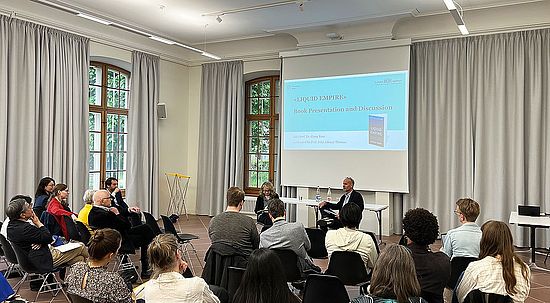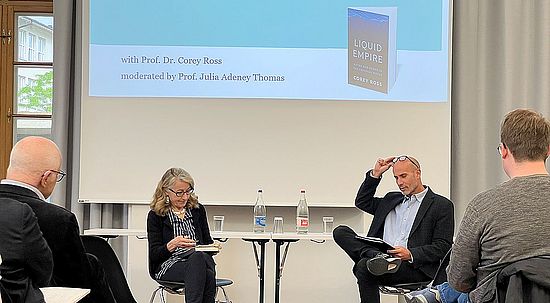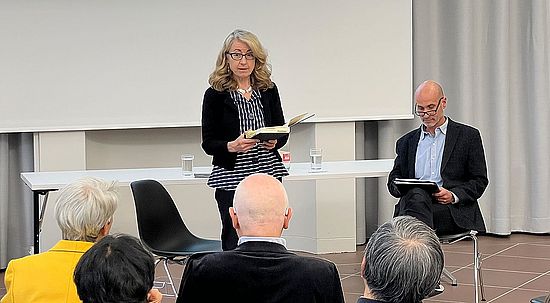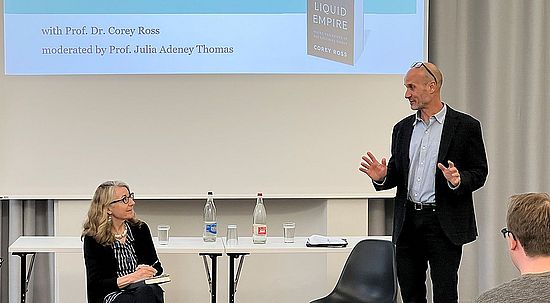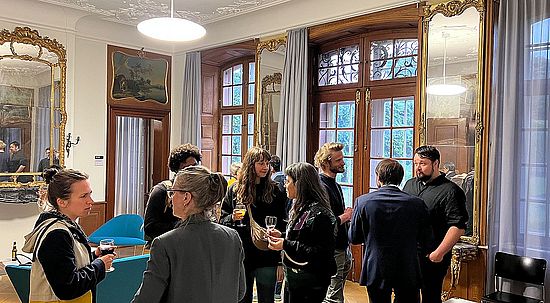/ News, Forschung, People
Book Launch with Corey Ross: "Liquid Empire: Water and Power in the Colonial World"





On May 14, 2025, Corey Ross, Director of the Institute for European Global Studies, presented his new book Liquid Empire: Water and Power in the Colonial World (Princeton University Press, 2024) in a discussion with renowned Anthropocene-historian Julia Adeney Thomas (University of Notre Dame, Indiana).
“There is trouble brewing in the world’s waters.” With these arresting words, Corey Ross opens the introduction to Liquid Empire, a sweeping and timely account of how water became not only a vital resource, but also a political tool in the making of Europe’s modern empires. Drawing on a wide array of case studies from sub-Saharan Africa to South and Southeast Asia, the book explores how imperial powers attempted to govern not just water itself, but also populations, economies, and environments through water.
The conversation with Julia Adeney Thomas—an intellectual historian and prominent member of the Anthropocene Working Group—offered a rich exchange on the environmental legacies of empire.
The initial conversation focused on the colonial ambition to master water systems and control seasonal flows. Ross argued that while water engineering projects often solved short-term problems—such as irrigation or flood control—they simultaneously created long-term environmental and social risks. His verdict was that engineering solutions rarely delivered on their promises without generating new vulnerabilities.
A second key theme addressed the relationship between water infrastructure and population growth. Ross highlighted how large-scale hydraulic projects, such as those in the Red River Delta in the 1920s and 1930s, were often designed with dual intentions: to increase agricultural output and to “solve” perceived population pressures. In this sense, water management was also a way to deal with demographic problems.
When asked whether path dependency plays a role in the history of water colonialism, Ross gave an intriguing response. Rather than framing history as a rigid sequence of cause and effect, he suggested that the infrastructures and rationalities built into colonial hydrological systems created a “smooth sense of momentum”—a logic that shaped the structures of water colonialism throughout the decades.
Finally, the discussion turned toward the broader environmental legacies of colonial water governance. Drawing on Thomas’s expertise in Anthropocene studies, both speakers emphasized that water provides a powerful analytical lens through which to examine the complex interplay of social, ecological, technological, and political forces in the age of climate change. For the humanities, they concluded, telling such entangled stories is central to understanding what it means to be human—and what we think is worth living for.
Corey Ross is Director of the Institute and Professor for European Global Studies. His research on the socio-environmental history of Europe’s relations with the rest of the world builds on interdisciplinarity, investigates the global, transimperial and transnational circulation of ideas, goods and people, and aims to highlight perspectives that are relevant to major present-day and future challenges.
Julia Adeney Thomas (University of Notre Dame) is spending part of May as a guest professor at the Europainstitut. As an intellectual historian of Japan and a member of the Anthropocene Working Group, Julia has a keen interest in combining intellectual history and environmental history as well as working across disciplines.

